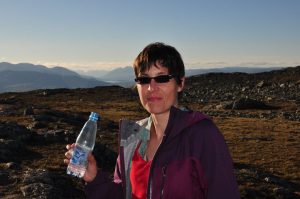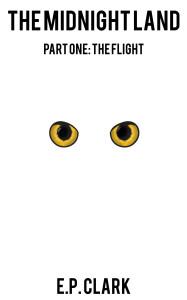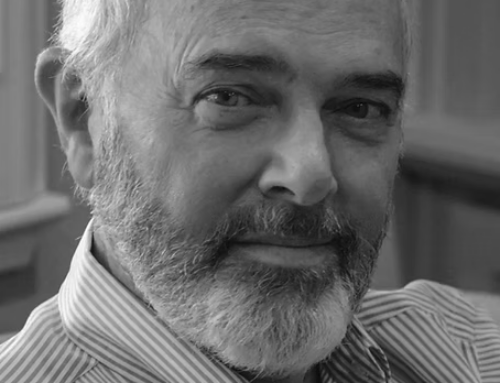 When she isn’t writing, E.P. Clark teaches Russian at Wake Forest University. “The Midnight Land” is her first full-length novel, but unlikely to be her last.
When she isn’t writing, E.P. Clark teaches Russian at Wake Forest University. “The Midnight Land” is her first full-length novel, but unlikely to be her last.
Tell us something about your book. The basics: what’s it about?
To pare it down to its essence, The Midnight Land is about a woman who has to figure out how to reconcile the demands of leadership and mercy. She’s basically empathic, so she’s constantly aware of the suffering of others around her, and also how stopping one person’s suffering might cause someone else to suffer. She has to figure out how to stand up to others without becoming a monster and the kind of person she despises, which is difficult, because she herself has suffered…if all this suffering makes you think of Russian literature, you’d be right! The external trappings of the story are a cross between epic fantasy and classical Russian literature, a sort of Tolstoy-meets-Tolkien mashup. I used a lot of motifs and imagery from Russian fairy tales and medieval Russian literature to create the world the book is set in, and there are a lot of allusions to works by Pushkin, Tolstoy, and so on, although I’d say the underlying sensibility is more Dostoyevskyan than anything else. I originally meant for it to be a novella, but by the time I was done, it was a 1000-page monster, which is only right, given its source materials, but meant I had to split it into two volumes in order to publish it. Since it’s the first part of a planned trilogy, The Zemnian Trilogy, about three separate central characters, if I ever finish it I should end up with a trilogy in 7 or 8 volumes, which delights the part of me that is still a Douglas Adams fangirl.
How did you come to self-publish? Did you try to get published traditionally?
About ten years ago, when I first got serious about my writing, I tried hawking my then-project, a detective novel, to various agents, all of which rejected me out of hand. I also wrote a number of short stories and novels, some of which were in fact published and some of which weren’t. Meanwhile, for my day job I was trying to get hired and get published as a professional academic. The vast quantities of rejections, and all the viciousness of academic publishing, made me decide I didn’t want to have to put myself through with my book because I didn’t want to end up hating my novel, and I wanted to have artistic control. So I thought I’d give self-publishing a go. It means I retain the rights to my work, to I didn’t see that I had anything to lose.
What self-publishing service did you use? Happy with the service?
I did everything through Amazon. I did everything for the Kindle version myself, with a little help proofreading. For the print version, I went through CreateSpace and hired their experts to help with formatting the interior and the cover. I’ve heard that the services are a bit pricey in comparison with what you can get on the open market, but I was very happy with the finished project.
What avenues have you taken to market the book? Have you gotten reviews, interviews, TV, print media coverage?
Marketing is my next challenge! My friends and family were very excited about the book and some of them kindly bought copies before I could even give them out for free, and then posted reviews on Amazon, which was great. I also gave away a number of copies to people who were interested, but I’m still waiting for the reviews from them (hint, hint if you’re reading this!). Because the book has a Russian/Slavic theme, I told my colleagues about it and made several sales that way. Now I’m sending it out for professional reviews, entering it into contests, and trying to get a larger presence on social media. Twitter and Goodreads have enabled me to make a lot of contacts with other indie authors and arrange for things like interviews on other people’s blogs and participation in online conventions and giveaways, so that seems promising.
What drove you to write this particular book?
I’d wanted to write a fantasy novel set in a Russia-like world for a long time, and I’d written some short stories that were published and even a draft of a novel that I believe has disappeared forever, thank goodness. I was planning to start on my next short story or novella when I came across the phrase “the midnight land,” referring to Russia, in a course on medieval Russian literature. I instantly knew I’d found the title for my next story, which morphed into this huge novel as I was working on it. As for some of the other elements in it, I’d also wanted to write something about a woman in a matrilineal, matriarchal society for a while. Most speculative fiction about matriarchal societies…well, it makes me go queer all over just to look at it, it’s so icky and unbelievable. The society of Zem’, the country The Midnight Land is set in, is very similar to a lot of other medieval-esque societies in fantasy fiction, except that power passes from mother to daughter and everyone takes that for granted. Most of the time when I’ve read about made-up matriarchal societies, the characters who encounter them are men, and the whole outlook is very much from our own, patriarchal, point of view. One of the most difficult things for me, but one of the things my readers have said they really enjoyed, was breaking free of that mindset and thinking about things from a point of view that says that of course women should be in charge: after all, they live longer, are less prone to irrational violent outbursts, are better at reading and writing, and there’s rarely any doubt about someone’s maternal lineage. At the same time, I wanted to emphasize that women in such a society would still love their sons, brothers, husbands, etc. very much–maybe a little too much!
Is the book in any one particular genre? Is it a genre that’s familiar to you?
It’s definitely fantasy, and I’m a huge fantasy fan and have the bulging bookshelves to prove it. And of course there’s the Russian literature angle to it, and since I have a Ph.D. in the topic, I guess that’s a genre that’s familiar to me as well 🙂
Who are your greatest writing influences?
For the fantasy part, of course I have to say Tolkien! But more obvious influences would be George R.R. Martin’s style of dark and realistic epic fantasy, and Terry Pratchett’s satire. I threw in a couple of allusions to both of them in the opening chapter of The Midnight Land, just for fun. Another fantasy author I admire tremendously is Jacqueline Carey; I don’t know how much her work has influenced mine, but I was definitely thinking about it, especially during the romance/sex scenes (for those of you who’ve gotten all excited, I have to confess that the romance/sex angle is pretty minimal in The Midnight Land, although that is probably going to change in The Dreaming Land, the last part of the trilogy). Another author I feel may have influenced me, or at least with whom I think my work shares something in common, is Amy Tan. That may not be an obvious comparison, but I really admire her “epic” stories of female relationships, and there’s definitely an element of that in my work. And then there’s the Russian influence…I could probably write an entire article on that, maybe a dissertation, but aside from the authors I’ve already mentioned, I have to say that Karolina Pavlova’s A Double Life was a huge influence. And Russian camp and war literature as well.
What’s your writing regimen? Any tips for keeping focused?
It changes every semester, depending on my teaching schedule and what else I have going on. Right now I’ve just started a new semester and marketing is taking up a huge amount of my writing time, so I have yet to settle into a regimen for this spring. But the thing that generally works for me is to find a particular time each day, which for me is either before I do anything else in the morning, or in the evening, after I do everything else, and write a little bit. I normally give myself page quotas and try to hit them. A lot of times those page quotas are pretty small–I started off with one page a day, then as I got faster I moved to two, and I can normally do two pages most days during the semester, although most days that has a tendency to happen while I’m eating supper. With such a small page quota, it doesn’t feel overwhelming and I don’t try to get out of it the way I would with a more demanding schedule, so I end up doing more. During school breaks, if I have the time, I’ll give myself a much bigger quota and do 3-5 pages in the morning and 3-5 pages in the afternoon. Anyway, for me the main thing is not to worry so much about the end product and just write a little bit on a regular basis, especially in that difficult midpoint when all you want to do is give up.

Unless a publisher offers me a deal I can’t refuse, I’m planning to self-publish the rest of the trilogy.
Any final words of advice for those looking to self-publish?
The freedom it offers is great, but the flipside of freedom is self-control. You have to be the one who makes yourself keep writing, and then makes yourself do all the editing and formatting that need to be done to end up with a quality product. And then you have to keep on yourself to do the marketing as well. So I guess I’d say don’t be afraid to jump in and do it, but you really do have to make a commitment to it if you’re going to do it well. It’s still a job, and you have to treat it as such and not give up the first time it stops being fun. Not that it’s not fun, but like most things there are un-fun moments, and you have to get through them and keep going.
Get an Editorial Review | Get Amazon Sales & Reviews | Get Edited | Get Beta Readers | Enter the SPR Book Awards | Other Marketing Services






















Leave A Comment